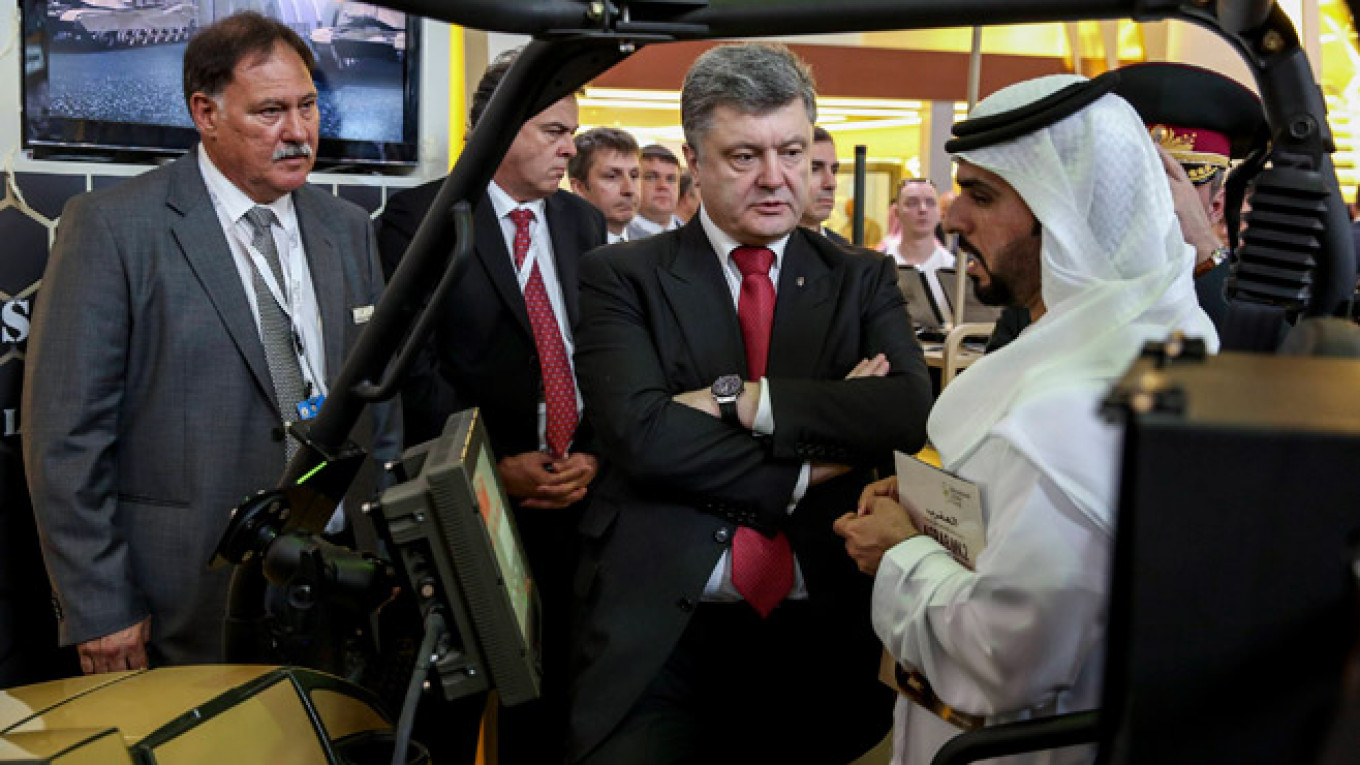The Middle East's relationship with Russia has been remarkable over the past month. A number of events are notable: Ukrainian President Petro Poroshenko's visit to the IDEX 2015 global arms fair in Abu Dhabi as a snub to Russia, the visit of Russian Security Council Secretary Nikolai Patrushev to Egypt and the United Arab Emirates to discuss the situation in Libya, the interpretation of Russian President Vladimir Putin's "Spring Break" and his return, and, of course, the progression of Russia's relationship with Iran and Syria.
These events and the Arab attitude toward the Kremlin's foreign policy are now becoming more important than ever in terms of transregional political and economic relations.
Poroshenko's visit to IDEX 2015 surprised many Arab officials, with claims that the Americans were behind the Ukrainian leader's visit. Arab officials noted that Poroshenko is seeking help with obtaining lethal anti-tank missiles for the Ukrainian armed forces. So far the Middle East has been pretty quiet about events in Ukraine.
Immediately after Poroshenko's trip, Russian Security Council Secretary Patrushev visited Cairo and Abu Dhabi, with the head of Russia's Ground Forces, Colonel General Oleg Salyukov, in tow.
The visit speaks loudly about Russia's goals in the region — helping to further cement defense support for Egypt, as well as securing its position in Libya by supporting the internationally recognized government in Tobruk. Both Tobruk and the Islamist government in Tripoli are courting Moscow and Kiev, respectively, for weapons support.
Putin's 10-day absence was also noticeable to Arab observers. The hysterical tone in the Western press was not replicated. One Arab official told me that the Russian president had "a back problem" and that he found the infowar amusing: "We Arabs know better, given our own politics regarding illnesses and rumor-mongering. There is no panic here."
Arab officials took a special interest in how the Chechen connection to Boris Nemtsov's murder played out during the past few weeks. Chechen leader Ramzan Kadyrov is well respected in both Jordan and the UAE, not only for his counter-terrorism capabilities, but also for his drive to invite investment from the Middle East to Chechnya.
"Just take a look at Grozny today," noted one Jordanian official, "it looks just like Dubai."
However, the last few weeks has also seen tensions rise between the Middle East and Russia over Syria and Iran. The Gulf Arabs are very critical of any nuclear agreement with Iran.
This fact might increase the cost for Russia in keeping Syrian President Bashar Assad in power in Damascus. With Saudi King Salman's ascent to the throne, along with Gulf Arab countries' discontent with the Kremlin's involvement in the Syrian peace talks, the Gulf Arabs want to punish the Kremlin for continuing to support Assad.
Ongoing oversupply of Gulf petroleum is keeping oil prices low, and that is crippling the Russian economy. Obviously, this anti-Moscow position will be exacerbated whether there is a positive or negative outcome of the world powers' negotiations with Iran.
If the outcome is positive, then there is a Gulf Arab fear that Tehran will declare victory, open its markets as sanctions are lifted and ditch Moscow, which will continue to be under Western sanctions.
If the outcome is negative, the Islamic republic will shore up its position in the Levant and Yemen, Moscow will have Iran as an ally in supporting Assad, and the Gulf Arabs will continue to blame Moscow for supporting Shiites over Sunnis.
Arabs hope that the rift between the West and Moscow opens a window of opportunity for investment cooperation and also for increased coordination in regional politics. What comes in the next few weeks may make the last month look boring.
Theodore Karasik is a Dubai-based geopolitical analyst.
A Message from The Moscow Times:
Dear readers,
We are facing unprecedented challenges. Russia's Prosecutor General's Office has designated The Moscow Times as an "undesirable" organization, criminalizing our work and putting our staff at risk of prosecution. This follows our earlier unjust labeling as a "foreign agent."
These actions are direct attempts to silence independent journalism in Russia. The authorities claim our work "discredits the decisions of the Russian leadership." We see things differently: we strive to provide accurate, unbiased reporting on Russia.
We, the journalists of The Moscow Times, refuse to be silenced. But to continue our work, we need your help.
Your support, no matter how small, makes a world of difference. If you can, please support us monthly starting from just $2. It's quick to set up, and every contribution makes a significant impact.
By supporting The Moscow Times, you're defending open, independent journalism in the face of repression. Thank you for standing with us.
Remind me later.


